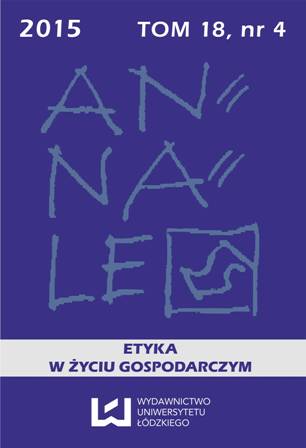Cryptocurrency with a Conscience: Using Artificial Intelligence to Develop Money that Advances Human Ethical Values
DOI:
https://doi.org/10.18778/1899-2226.18.4.06Słowa kluczowe:
cryptocurrency, socially responsible investing, payment systems, business ethics, economic cyberneticsAbstrakt
Cryptocurrencies like Bitcoin are offering new avenues for economic empowerment to individuals around the world. However, they also provide a powerful tool that facilitates criminal activities such as human trafficking and illegal weapons sales that cause great harm to individuals and communities. Cryptocurrency advocates have argued that the ethical dimensions of cryptocurrency are not qualitatively new, insofar as money has always been understood as a passive instrument that lacks ethical values and can be used for good or ill purposes. In this paper, we challenge such a presumption that money must be ‘value-neutral.’ Building on advances in artificial intelligence, cryptography, and machine ethics, we argue that it is possible to design artificially intelligent cryptocurrencies that are not ethically neutral but which autonomously regulate their own use in a way that reflects the ethical values of particular human beings – or even entire human societies. We propose a technological framework for such cryptocurrencies and then analyse the legal, ethical, and economic implications of their use. Finally, we suggest that the development of cryptocurrencies possessing ethical as well as monetary value can provide human beings with a new economic means of positively influencing the ethos and values of their societies.Bibliografia
Barber S., X. Boyen, E. Shi, E. Uzun, Bitter to Better – How to Make Bitcoin a Better Currency [in:] Financial Cryptography and Data Security, Lecture Notes in Computer Science 7397, ed. A.D. Keromytis, Springer, Berlin/Heidelberg 2012, pp. 399–414, doi:10.1007/978-3-642-32946-3_29
Google Scholar
DOI: https://doi.org/10.1007/978-3-642-32946-3_29
Browning L., Oglala Sioux Hope Bitcoin Alternative, Mazacoin, Will Change Economic Woes, “Newsweek” 2014, August 14, http://www.newsweek.com/2014/08/22/tribebrought-you-custers-last-stand-sitting-bulls-bitcoin-264440.html
Google Scholar
Calverley D.J., Imagining a Non-Biological Machine as a Legal Person, “AI & SOCIETY” 2008, Vol. 22, No. 4, pp. 523–37.
Google Scholar
DOI: https://doi.org/10.1007/s00146-007-0092-7
Gilbert D., “Most Valuable Tweet in History” Donates $11,000 Worth of Dogecoin to Kenyan Water Charity, “International Business Times UK” 2014, March 17, http://www.ibtimes.co.uk/most-valuable-tweet-history-donates-11000-worth-dogecoin-kenyan-water-charity-1440565
Google Scholar
Gilpin L., How Zidisha Sidestepped Banks and Took Microfinancing Peer-to-Peer, “TechRepublic” 2014, May 1, https://www.techrepublic.com/article/how-zidisha-sidestepped-banks-and-took-microfinancing-peer-to-peer/
Google Scholar
Gladden M.E., Tachikomatic Domains: Utopian Cyberspace as a “Contingent Heaven” for Humans, Robots, and Hybrid Intelligences, [conference presentation at:] His Master’s Voice: Utopias and Dystopias in Audiovisual Culture, Ośrodek Badawczy Facta Ficta, Uniwersytet Jagielloński, March 24, 2015.
Google Scholar
Gladdn M.E., The Artificial Life-Form as Entrepreneur: Synthetic Organism-Enterprises and the Reconceptualization of Business [in:] Proceedings of the Fourteenth International Conference on the Synthesis and Simulation of Living Systems, eds. H. Sayama, J. Rieffel, S. Risi, R. Doursat, H. Lipson, The MIT Press, Cambridge, Massachusetts 2014, pp. 417–18.
Google Scholar
DOI: https://doi.org/10.7551/978-0-262-32621-6-ch067
Gustanski J.A., R.H. Squires, Protecting the Land: Conservation Easements Past, Present, and Future, Island Press, Washington, DC 2000.
Google Scholar
Heger M., Cryptographers Take on Quantum Computers, “IEEE Spectrum” 2009, January 1, http://spectrum.ieee.org/computing/software/cryptographers-take-on-quantum-computers
Google Scholar
DOI: https://doi.org/10.1109/MSPEC.2009.4734299
Hilbert M., The Maturing Concept of E-Democracy: From E-Voting and Online Consultations to Democratic Value Out of Jumbled Online Chatter, “Journal of Information Technology & Politics” 2009, Vol. 6, No. 2, pp. 87–110, doi:10.1080/1933168080 2715242.
Google Scholar
DOI: https://doi.org/10.1080/19331680802715242
Malloy M.P., Human Rights and Unintended Consequences: Empirical Analysis of International Economic Sanctions in Contemporary Practice, “Boston University International Law Journal” 2013, Vol. 31, pp. 79–129.
Google Scholar
McGoey L., The Philanthropic State: Market-state Hybrids in the Philanthrocapitalist Turn, “Third World Quarterly” 2014, Vol. 35, No. 1, pp. 109–25, doi:10.1080/01436597. 2014.868989.
Google Scholar
DOI: https://doi.org/10.1080/01436597.2014.868989
Muehlhauser L., L. Helm, The Singularity and Machine Ethics [in:] Singularity Hypotheses, eds. A.H. Eden, J.H. Moor, J.H. Søraker, E. Steinhart, Springer, Berlin/Heidelberg 2012, pp. 101–26.
Google Scholar
DOI: https://doi.org/10.1007/978-3-642-32560-1_6
Nath H.V., B.M. Mehtre, Static Malware Analysis Using Machine Learning Methods [in:] Recent Trends in Computer Networks and Distributed Systems Security, Communications in Computer and Information Science 420, eds. G. Martínez Pérez, S.M. Thampi, R. Ko, L. Shu, Springer, Berlin Heidelberg 2014, pp. 440–50.
Google Scholar
DOI: https://doi.org/10.1007/978-3-642-54525-2_39
Palaniappan R., Two-Stage Biometric Authentication Method Using Thought Activity Brain Waves, “International Journal of Neural Systems” 2008, Vol. 18, No. 1, pp. 59–66, doi:10.1142/S0129065708001373.
Google Scholar
DOI: https://doi.org/10.1142/S0129065708001373
Philips M., How the Robots Lost: High-Frequency Trading’s Rise and Fall, “BloombergView” 2012, June 6, https://www.bloomberg.com/news/articles/2013-06-06/how-the-robots-lost-high-frequency-tradings-rise-and-fall#xj4y7vzkg
Google Scholar
Pla J.J., K.Y. Tan, J.P. Dehollain, W.H. Lim, J.J.L. Morton, D.N. Jamieson, A.S. Dzurak, A. Morello, A Single-Atom Electron Spin Qubit in Silicon, “Nature” 2012, Vol. 489, No. 7417, pp. 541–45, doi:10.1038/nature11449.
Google Scholar
DOI: https://doi.org/10.1038/nature11449
Pribra K.H., Prolegomenon for a Holonomic Brain Theory [in:] Synergetics of Cognition, Springer Series in Synergetics 45, eds. H. Haken, M. Stadler, Springer, Berlin/Heidelberg 1990, pp. 150–84.
Google Scholar
DOI: https://doi.org/10.1007/978-3-642-48779-8_10
Scopin G., Do Automated Trading Systems Dream of Manipulating the Price of Futures Contracts? Policing Markets for Improper Trading Practices by Algorithmic Robots, “Florida Law Review” 2015, Vol. 67, pp. 221–293.
Google Scholar
Sharf S., Can Robo-Advisors Survive A Bear Market?, “Forbes” 2015, January 28, http://www.forbes.com/sites/samanthasharf/2015/01/28/can-robo-advisors-survive-a-bearmarket/
Google Scholar
Trautan L.J., Virtual Currencies; Bitcoin & What Now after Liberty Reserve, Silk Road, and Mt. Gox?, “Richmond Journal of Law and Technology” 2014, Vol. 20, No. 4, http://jolt.richmond.edu/v20i4/article13.pdf
Google Scholar
DOI: https://doi.org/10.2139/ssrn.2393537
Volna E., M. Kotyrba, V. Kocian, M. Janosek, Cryptography Based On Neural Network [in:] Proceedings of the 26th European Conference on Modelling and Simulation, ed. K.G. Troitzsch, M. Möhring, U. Lotzmann, European Council for Modelling and Simulation 2012, pp. 386–91.
Google Scholar
DOI: https://doi.org/10.7148/2012-0386-0391
Wallach W., Robot Minds and Human Ethics: The Need for a Comprehensive Model of Moral Decision Making, “Ethics and Information Technology” 2010, Vol. 12, No. 3, pp. 243–50, doi:10.1007/s10676-010-9232-8.
Google Scholar
DOI: https://doi.org/10.1007/s10676-010-9232-8
Pobrania
Opublikowane
Jak cytować
Numer
Dział
Licencja

Utwór dostępny jest na licencji Creative Commons Uznanie autorstwa – Użycie niekomercyjne – Bez utworów zależnych 4.0 Międzynarodowe.









